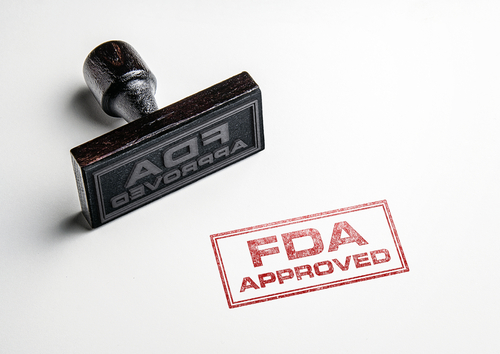The U.S. Food and Drug Administration (FDA) has approved Keytruda (pembrolizumab), in combination with chemotherapy, to treat people with advanced triple-negative breast cancer (TNBC) and at least 10% of tumor cells positive for PD-L1.
The indication includes patients with locally recurrent and inoperable or metastatic tumors, not previously treated with chemotherapy.
Tumor PD-L1 status will be determined by the PD-L1 IHC 22C3 pharmDx test (marketed by Dako, a subsidiary of Agilent), which was approved simultaneously by the FDA as a companion diagnostic to identify patients eligible for the combination therapy.
This accelerated approval comes less than four months after the FDA granted priority review to Merck’s supplemental biologics license application and before its due date — set for Nov. 28, 2020. Merck, known as MSD outside North America, is the developer and owner of Keytruda.
“Today’s approval is a significant milestone, as it represents the first approval for Keytruda in the breast cancer setting,” Roy Baynes, MD, PhD, the chief medical officer and senior vice president and head of global clinical development at Merck Research Laboratories, said in a press release.
Hope Rugo, the director of breast oncology and clinical trials education at University of California San Francisco’s Helen Diller Family Comprehensive Cancer Center, said that “approximately 15-20% of patients with breast cancer are diagnosed with triple-negative breast cancer, which is a difficult-to-treat and aggressive cancer.”
“The approval of Keytruda in combination with chemotherapy gives physicians an important new option for appropriate patients,” Rugo added.
An immune checkpoint inhibitor, Keytruda works by preventing an immune evasion mechanism involving the interaction between PD-L1 in cancer cells and the PD-1 receptor in T-cells, immune cells involved in the fight against cancer. By blocking this interaction, the therapy boosts anti-cancer responses and promotes cancer cell death.
Approval was based on results from the KEYNOTE-355 Phase 3 study (NCT02819518), which is evaluating the safety and effectiveness of Keytruda in combination with chemotherapy, compared with chemotherapy alone, in 847 women with locally recurrent and inoperable or metastatic TNBC, regardless of tumor PD-L1 status.
Participants, who had not previously been treated with chemotherapy, were randomly assigned to either 200 mg of Keytruda or a placebo, every three weeks, in addition to one of three chemotherapy agents: Abraxane (nab-paclitaxel), Taxol (paclitaxel) or Gemzar/Paraplatin (gemcitabine/carboplatin).
The women’s median age was 53 (range, 22 to 85), and most were white (68%) and post-menopausal (68%). Also, 75% had 1% or more of tumor cells producing PD-L1 (PD-L1-positive tumors), and 38% had at least 10% PD-L1-positive tumor cells (high-PD-L1 tumors).
The trial’s main goals are to assess whether the combination therapy is superior to chemotherapy alone at prolonging the time women lived without signs of disease progression (a measure called progression-free survival), and at improving their overall survival.
Both primary goals will be assessed in all participants, those with PD-L1-positive tumors, and those with high-PD-L1 tumors.
Secondary goals include treatment response rates, duration of responses, disease control rate, and quality of life measures in the overall population and in the two PD-L1-positive subgroups. Safety is also being examined.
KEYNOTE-355’s latest data, at a median follow-up of more than one year, showed that women with high-PD-L1 tumors benefited the most from the combination therapy.
Among this subgroup, women given the combo treatment lived significantly longer without signs of disease progression (median of 9.7 months), compared with those given the same chemotherapy regimens alone (5.6 months), representing a 35% reduced risk of disease progression or death.
Disease progression also occurred in a lower proportion of the women on combination therapy than among those receiving chemotherapy alone (62% vs. 77%)
In addition, the Keytruda-chemotherapy combo resulted in better treatment responses than the same chemotherapy regimens alone in this subgroup of patients (53% vs. 40% of overall responses, 17% vs. 13% of complete responses). Treatment responses were also more than two times longer with the combination therapy (median of 19.3 months vs. 7.3 months with chemotherapy alone).
Keytruda’s safety profile was consistent with that reported in previous trials, and no new safety concerns were identified.
The most common adverse reactions (side effects) in women on the combination therapy were fatigue (48%), nausea (44%), hair loss (34%), diarrhea and constipation (28% each), vomiting and rash (26% each), cough (23%), decreased appetite (21%), and headache (20%).
Serious side effects were reported in 30% of combination patients, and adverse events led to combination therapy interruption in 50% of them and to its discontinuation in 11%. Fatal side effects occurred in 2.5% of women on the combination therapy, including cardio-respiratory arrest (0.7%) and septic shock (0.3%).
“In the study supporting this approval, Keytruda in combination with … [chemotherapy] significantly improved progression-free survival for patients with advanced triple-negative breast cancer whose tumors express [high] PD-L1 … compared with the same chemotherapy regimens alone,” Baynes said.
Follow-up is ongoing to assess the benefits of the Keytruda-chemotherapy combo in participants’ overall survival — important for continued (full) approval of the combination for these patients.

